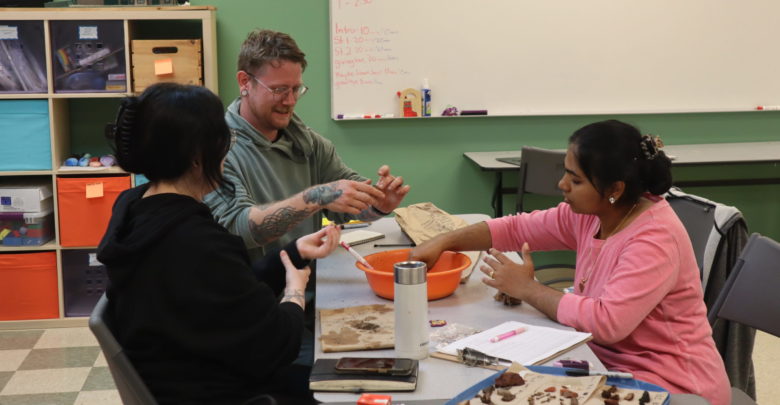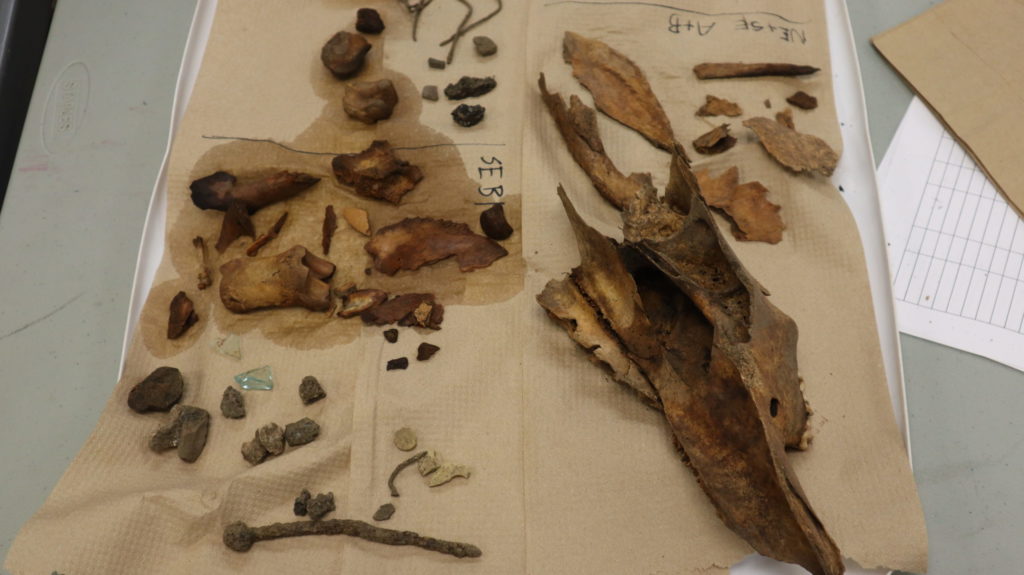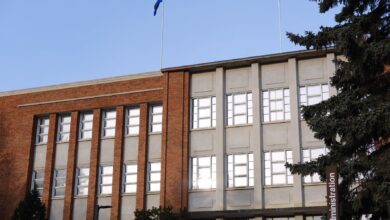 Lily Polenchuk
Lily PolenchukIn St. Albert, University of Alberta archaeology students are currently digging for objects from Métis history by using drone surveys, excavation methods, and ground penetrating radar.
Field School, a program from the U of A’s Institute of Prairie and Indigenous Archaeology (IPIA), is led by Kisha Supernant, a professor in the department of anthropology and director of the IPIA. The program, offered through the department of anthropology, is in collaboration with the Arts and Heritage Foundation of St. Albert and the Métis Nation of Alberta.
This year, Field School chose to dig at the Historic River Lots and Grain Elevators site, which is part of the Arts and Heritage Foundation of St. Albert. This is because the site already shows Métis history through buildings and cultural programming, Supernant said.
“We wanted to work in partnership with the community around exploring the material history of Métis people in the area. There’s also a buried history here that we wanted to work with the site and the community to uncover.”
Objects found have “a lot of meaning and power in the present”
The river lots were once a common way of dividing land in Métis and French-Canadian communities. Field School is currently working at River Lot 24. On this site stands the house of the Cunninghams, a once large and prominent Métis family, Supernant said.
“The Cunningham family built a winter house on River Lot 24. In 1912, Alfred and Amelia Cunningham lived in that winter house. This was to make sure that their children could go to school more easily in the winter. That house is still standing, and it is apart of the interpretive history of this place,” Supernant explained.
“The Cunningham family is very prominent in St. Albert’s Métis history. It’s not just people with the surname Cunningham now that are connected to that family. There are many Métis folks connected. So we’re learning a lot more about their day-to-day lives.”
Specifically, the students are digging in what was once most likely a root cellar, and then made into a garbage dump. Supernant said that the Cunninghams were probably the ones who transformed it into a garbage dump. The students work in excavation units of squares, and they dig slowly to not miss anything.

“The dump is fabulous for archaeologists because it’s so full of material from day-to-day life that you discard,” Supernant said. Findings so far include glass and metal objects, nails, cow bones, construction materials such as bricks and mortar, and patterned ceramics.
Supernant added that the team has also found an intact medicine bottle. “The medicine was originally made in Paris, we think. It would’ve have made its way out to St. Albert sometime in the early part of the 20th century.”
According to Supernant, the findings can fill in gaps in stories from Métis history. She added that most likely, they are examining the lives of the Cunninghams through the materials that they left behind.
“If you think about how history is told, it tends to be very broad … but what kind of medicine they used or what kind of dish-ware they were using — those little details are often not recorded. We are, I think, enhancing some of that story by what we’re finding.”
Supernant added that it’s important to connect the objects to the contemporary Métis community.
“Métis people are still here and still a prominent part of this place. We have been learning from them as well. We did some beadwork, and we learned about the history of this place,” she said.
“So learning about contemporary Métis culture, connecting the past and present, and making sure that’s a core part of how we approach the archaeology. It’s not just about people and objects of the past. These have a lot of meaning and power in the present.”
“Being able to dig and work with objects my ancestors may have interacted with is super awesome,” Métis student says
Cassidy Rose Wambold is entering her third year as a Bachelor of Arts student. She is majoring in anthropology with a focus on archaeology. Wambold said that Field School has allowed her to reconnect with her family’s history.
“I’m Métis, so being able to dig and work with objects my ancestors may have interacted with is super awesome. It’s actually one of the ways I’ve been able to reconnect with that part of my family,” Wambold said.
“I’m actually one of the first generations of my family to have been able to practice being Métis for my whole life. It’s been really heartwarming.”
For Cody Hemmingsen, a graduate student who studied anthropology in his undergraduate degree, Field School has been “a really informative experience overall.”
“I did do a few classes on Métis history when I was in school. Just being able to connect the dots with what I’ve learned has been really helpful,” Hemmingsen said.
Blanka Stepankova is entering her fourth year as a Bachelor of Arts student. She is majoring in anthropology, focusing on biological anthropology and zooarchaeology. For Stepankova, the archaeological aspect is of particular interest.
“It’s really interesting to be able to apply the theories, methods, and practices we’ve learned in the classroom to the real world and actually doing archaeology,” Stepankova said. “I do have to say it is physically demanding … but in a good way. It is really fun and we have a great team here.”
The findings will go to the Royal Alberta Museum, which “is required in Alberta,” Supernant said. She added that she’s having conversations with the Arts and Heritage Foundation of St. Albert to see if connection with the objects can be maintained.
“I think there’s interest in figuring out a way to make sure that some of these belongings can stay connected to this place. But, that’s a conversation that will be evolving.”




